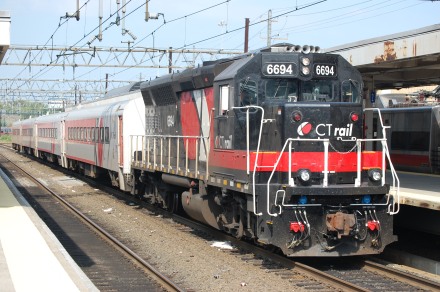Jim Cameron, a Connecticut commuter rail advocate generally tight with Connecticut DOT and Metro-North, has an interview with CTDOT Commissioner Joe Giulietti (a former president of Metro-North) in the CT Mirror this week. Most of it isn’t super interesting, per the generally restore-the-status-quo orientation that both men seem to share, but Giulietti did drop one interesting nugget:
Rail and signal enhancements on the diesel-only Waterbury branch line will mean expanded service but not new cars, at least not yet. The CDOT request to the tiny rail car industry for new cars proposals brought a dismal response, but the agency is working on other ways of modernizing the fleet.
So, it appears that CTDOT’s attempt at procuring a branchline push-pull fleet has failed–whether the “dismal” response means zero responses, or just none that were acceptable to CTDOT, I don’t know. Robert Hale breaks this down more in a blog post, noting that in addition to failing to take advantage of changing FRA rules, the RFP seems to have misstated which subpart of the relevant regulation. The CTDOT procurement likely violated at least one of the rules of good procurement that Alon Levy laid out in a recent post, namely
Avoid any weird process or requirements. The RFPs should look like what successful international contractors are used to; this has been a recent problem of American rolling stock procurement, which has excessively long RFPs defining what a train is, rather than the most standard documents used in Europe. This rule is especially important for peripheral markets, such as the entire United States – the contractor knows what they’re doing better than you, so you should adapt to them.
But it’s likely that the reasons that CTDOT got a poor response go beyond the purely technical. It’s possible that the small size of the potential order was a turn-off for vendors–the logic of fleet unification often touted by North American transit agencies would actually argue for electrifying the remaining Connecticut branch lines and procuring an extension of the still-being-delivered M8 EMU order–but I think we can look at another recent commuter rail procurement fiasco for a more basic logic.
In 2016, Metra issued an RFP for more of the same “gallery” coaches that most Chicago commuter services have used since the 1950s (literally, the design is essentially unchanged). Somewhat predictably, the railcar industry as a whole said “STOP DOING THAT” and returned zero bids. In the end (and after one more interim RFP failure) Metra finally asked for alternative designs, and in January 2021 initiated a very large order for much more modern Alstom coaches. I suspect, though do not know for sure, that the response to the CTDOT RFP was very similar. In addition to rebelling against overly complicated and specific RFPs, it seems like the industry may be trying, inconsistently and slowly, to nudge American passenger railroads in the direction of compatibility with standard international practice.
As Jake Blumgart wrote in May, the ongoing pandemic poses a serious threat to the commuter rail model as it exists in most cases in North America. But it’s not the only threat. RFPs for rolling stock get messy all the time even in Europe, but it’s usually not because the railcar building industry says “no thanks, your business isn’t worth the trouble it would bring us.” Full-body failure of an RFP means that older, less reliable and comfortable trains stay on the tracks for longer; Metra’s refusal to procure modern trains in 2016 seems to have cost riders four to five years of delay in getting newer trains. If this continues happening, at some point it’s going to cause a serious problem for someone, whether a major gap in fleet coverage or, God forbid, a derailment because of exhausted equipment, or simply incredibly unreliable service. Conservative agencies like to talk up the risks of equipment they’re not familiar with, even if it’s proven in much more intensive operating environments elsewhere. But by in many cases refusing to adapt to modernity, they’re simply transferring the risk to riders–and there’s no guarantee that riders will have patience for it.
To end on a note of optimism, Metra’s final procurement choice was pretty solid. I would’ve preferred DMUs or an electrification program and EMUs, but in the context of immediate needs it’s very defensible and the coaches should be nice. Perhaps–I hope!–the end result in Connecticut will be the same, or perhaps even better. Part of Cameron’s interview with Giulietti covers CTDOT’s need to staff up to cover expanded activity under the infrastructure bill and to replace an outflux of aging staff. Maybe they can hire a bunch of bright, creative-thinking, curious young people who will be able to learn about and follow modern practices in rolling stock procurement, now and for a long time to come.
Featured image: Interstate Railfan, CC BY-SA 4.0 https://creativecommons.org/licenses/by-sa/4.0, via Wikimedia Commons

“I would’ve preferred DMUs or an electrification program and EMUs.” Me too.